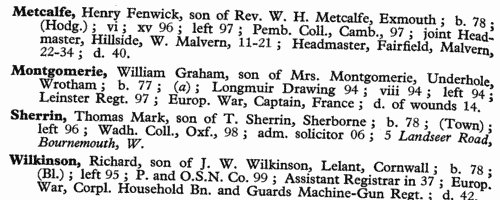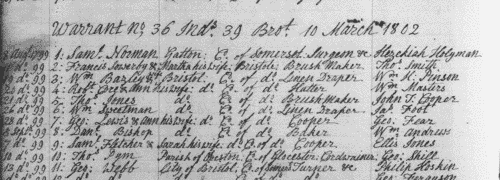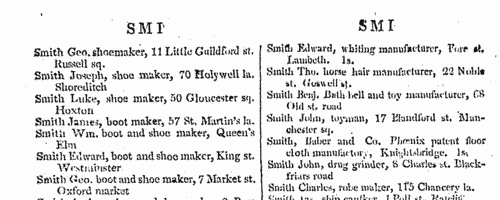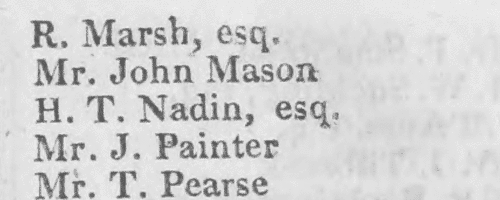Ditcher Surname Ancestry ResultsOur indexes 1000-1999 include entries for the spelling 'ditcher'. In the period you have requested, we have the following 38 records (displaying 21 to 30): Single Surname Subscription | | | Buying all 38 results of this search individually would cost £242.00. But you can have free access to all 38 records for a year, to view, to save and print, for £100. Save £142.00. More... |
These sample scans are from the original record. You will get scans of the full pages or articles where the surname you searched for has been found. Your web browser may prevent the sample windows from opening; in this case please change your browser settings to allow pop-up windows from this site. Boys entering Sherborne School
(1778)
The grammar school at Sherborne in Dorset, which doubtless existed from the creation of the diocese of Sherborne in 705, was refounded by king Edward VI in 1550. At the quatercentenary in 1950, a fourth edition of the Sherborne Register was published, listing boys entering the school during those four centuries. In truth, the materials for this register survive but fitfully before 1823; for some years, no names are known; sometimes all that is known is a surname. But from 1823 onwards the lists and the details get steadily more comprehensive. By the 20th century the boys are listed alphabetically by surname under term of entrance. Surname is given in bold, then christian names, name of father (surname and initials) and address; year of birth; house (a, School House; b, Abbey House; c, The Green; d, Harper House (formerly The Retreat); f, Abbeylands; g, Lyon House; h, Westcott House); whether represented the school at cricket (xi), football (xv), shooting (viii), &c.; year of leaving; summary of degrees, career &c.; and (in italics), address as of 1950. Names in the early lists marked with an asterisk are found inscribed on the oak panelling or on the stone walls of the former schoolroom. (F) in the lists indicates a foundationer, receiving free education: after 1827, when this privilege was restricted to boys from Sherborne and neighbourhood, nearly all foundationers were day-boys.DITCHER. Cost: £4.00.  | Sample scan, click to enlarge

| Deaths, Marriages, News and Promotions
(1781)
Death notices and obituaries, marriage and birth notices, civil and military promotions, clerical preferments, and bankrupts, as reported in the Gentleman's Magazine. Mostly from England and Wales, but items from Ireland, Scotland and abroad.
DITCHER. Cost: £4.00.  | Sample scan, click to enlarge

| Members of the Society for the Encouragement of Arts &c.
(1791)
The list of contributing members of the Society for the Encouragement of Arts, Manufactures, and Commerce: those marked ** pay 5 guineas a year; * 3 guineas a year; those with P are perpetual members; those with a double dagger have served of office of steward; and those with a single dagger are stewards elect.DITCHER. Cost: £4.00.  | Sample scan, click to enlarge

|  Masters of apprentices and clerks
(1802) Masters of apprentices and clerks
(1802)
Apprenticeship indentures and clerks' articles were subject to a 6d or 12d per pound stamp duty: the registers of the payments usually give the master's trade, address, and occupation, and the apprentice's name, as well as details of the date and length of the apprenticeship. 3 June to 31 December 1802. IR 1/39DITCHER. Cost: £8.00.  | Sample scan, click to enlarge

|  Masters of apprentices registered in Sussex
(1802) Masters of apprentices registered in Sussex
(1802)
Apprenticeship indentures and clerks' articles were subject to a 6d or 12d per pound stamp duty: the registers of the payments usually give the master's trade, address, and occupation, and the apprentice's name, as well as details of the date and length of the apprenticeship. There are central registers for collections of the stamp duty in London, as well as returns from collectors in the provinces. These collectors generally received duty just from their own county, but sometimes from further afield. The indentures themselves can date from a year or two earlier than this return. (The sample entry shown on this scan is taken from a Bristol return. Each entry has two scans, the other being the facing page with the details of the indenture, length of service, and payment of duty.) IR 1/70DITCHER. Cost: £8.00.  | Sample scan, click to enlarge

|  Masters of apprentices and clerks
(1803) Masters of apprentices and clerks
(1803)
Apprenticeship indentures and clerks' articles were subject to a 6d or 12d per pound stamp duty: the registers of the payments usually give the master's trade, address, and occupation, and the apprentice's name, as well as details of the date and length of the apprenticeship. 3 January to 31 December 1803. IR 1/39DITCHER. Cost: £8.00.  | Sample scan, click to enlarge

| Traders and professionals in London
(1805)
Holden's Triennial Directory for 1805 to 1807 includes this 'London Alphabet of Businesses, Professions, &c.': coverage is good; about 30,000 individuals are recorded.DITCHER. Cost: £4.00.  | Sample scan, click to enlarge

| Subscribers to The Racing Calendar: Shropshire
(1813)
The list of subscribers to The Racing Calendar for the Year 1813 by Edward and James Weatherby (Volume 41) commences with the nobility, by rank. The main mass of subscribers are then listed county by English county, and Wales, Scotland, and Ireland. Initials are often given, christian names occasionally, addresses hardly ever.DITCHER. Cost: £6.00.  | Sample scan, click to enlarge

| Deaths, Marriages, News and Promotions
(1840)
Death notices and obituaries, marriage and birth notices, civil and military promotions, clerical preferments and domestic occurrences, as reported in the Gentleman's Magazine. Mostly from England and Wales, but items from Ireland, Scotland and abroad.
DITCHER. Cost: £4.00.  | Sample scan, click to enlarge

|  Persons of standing recommending London police recruits
(1843-1857) Persons of standing recommending London police recruits
(1843-1857)
The Metropolitan Police Register of Joiners (MEPO 4/334) lists policemen joining the force 1 January 1843 to 1 April 1857 (warrant numbers 19893 to 35804). The register is alphabetical, in so far as the recruits are listed chronologically grouped under first letter of surname. It gives Date of Appointment, Name, Number of Warrant, Cause of Removal from Force (resigned, dismissed, promoted or died), and Date of Removal. Although the register was closed for new entrants at the end of 1842, the details of removals were always recorded, some being twenty or more years later. Those recruits not formerly in the police, the army, or some government department, were required to provide (normally) at least two letters of recommendation from persons of standing, and details of these are entered on the facing pages. Where a recruit was only recently arrived in the metropolis, the names and addresses of the recommenders can be invaluable for tracing where he came from. Those recruits not formerly in the police, the army, or some government department, were required to provide (normally) at least two letters of recommendation from persons of standing, and details of these are entered on the facing pages: the names in these are indexed here (the police recruits are indexed separately and not included here). Recruits transferred from other forces or rejoining the force did not normally need recommendations - in the latter case, former warrant numbers are given - but some recommendations are from police inspectors, even other constables. Recruits coming from the army sometimes have general military certificates of good conduct, but most often have a letter from their former commanding officer; recruits recommended by government departments (most often the Home Office) similarly have letters from the head of department. But the great majority of the names and addresses in these pages are of respectable citizens having some sort of personal acquaintance with the recruit. Where more than two recommendations were provided, the clerk would only record one or two, with the words 'and others'. Tradesmen are sometimes identified as such by their occupations; there are some gentry. Although the bulk of these names are from London and the home counties, a scattering are from further afield throughout Britain and Ireland. DITCHER. Cost: £8.00.  | Sample scan, click to enlarge

|
Research your ancestry, family history, genealogy and one-name study by direct access to original records and archives indexed by surname.
|













